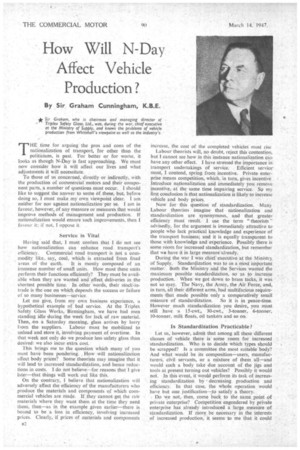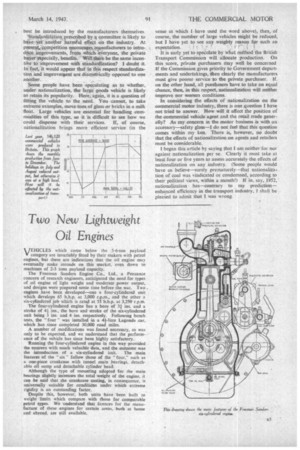How Will N-Day Affect Vehicle Production?
Page 36

Page 37

If you've noticed an error in this article please click here to report it so we can fix it.
By Sir. Graham Cunningham, K.B.E.
THE time for arguing the pros and cons of the nationalization of transport, for other than the politicians, is past. For better or for worse, it looks as though N-Day is fast approaching. We must now consider how it will affect our lives and what adjustments it will necessitate.
To those of us concerned, directly or indirectly, with the production of commercial motors and their component parts, a number of questions must occur. I should like to suggest the answer to some of these, but, before doing so, I must make my own viewpoint dear. I amn neither for nor against nationalization-per se. I am in favour, however, of any measure or measures that would improve methods of management and production. If nationalization would ensure such improvements, then I favour it: if not. I oppose it.
Service is Vital Having said that, I must confess that I do not see how nationalization can enhance road transport's efficiency. Commercial road transport is not a commodity like, say, coal, which is extracted from fixed
areas of the earth. It is mostly composed of an immense number of small units. How must these units perform their functions efficiently? They must be available when they are wanted and effect deliveries in the shortest possible time. In other words, their stock-intrade is the one on which depends the success or failure of so many businesses—service.
Let me give, from my own business experience, a hypothetical example of bad service. At the Triplex Safety Glass Works, Birmingham. we have had men standing idle during the week for lack of raw material. Then, on a Saturday morning, giass arrives by lorry from the suppliers. Labour must be mobilized to unload and store it, involving payment of overtime. In that week not only do we produce less safety glass than desired: we also incur extra cost.
This brings me to the question which many of you must have been pondering. , How will nationalization affect body prices? Some theorists may imagine that it will lead to increased standardization, and hence reductions in costs. I do not believe—for reasons that I give later—that things will work out like this.
On the contrary, I believe that nationalization will adversely affect the efficiency of the manufacturers who produce the materials and components of which commercial vehicles are made. If they cannot-get, the raw materials where they want them at the time they need them, then—as in the example given earlier—there is bound to be a loss in efficiency, involving increased prices. Clearly, if prices of materials and components increase, the cost of the completed vehicles must rise Labour theorists will, no doubt, reject this contention. but I cannot see how in this instance nationalization can have any other effect. I have stressed the importance in transport undertakings of service. Efficient service must, I contend, spring from incentive. Private enterprise means competition, which, in turn, gives incentive Introduce nationalization and immediately you remove incentive, at the same time impairing service. So my first conclusion is that nationalization is likely to increase vehicle and body prices.
Now for this question of standardization. Many Labour theorists imagine that nationalization and standardization are synonymous, and that greater efficiency must result. I use the term " theorists " advisedly, for the argument is immediately attractive to people who lack practical knowledge and experience of the transport business; and it is equally transparent to those with knowledge and experience. Possibly there is some room for increased standardization, but remember that we have it in large measure already.
During the war I was chief executive at the Ministry of Supply. Standardization was to us a most important matter. Both the Ministry and the Services wanted the maximum possible standardization, -so as to increase production. When we got down to brass tacks, it was not so easy, The Navy, the Army, the Air. Force, and, in turn, all their different arms, had multifarious requirements that made possible only a comparatively small measure of standardization. So it is in peace-time. However much standardization you desire, you must still have a 15-cwt., 30-cwt., 3-tanner, 6-tormer, 10-tanner. milk floats, oil tankers and so on.
Is Standardization Practicable ?
Let us, however, admit that among all these different classes of vehicle there is some room for increased standardization. Who is to decide which types should be scrapped? Is a committee the most suitable body? And what would be its composition—users, manufacturers, civil servants, or a mixture of them all—and would such a body take due account of the jigs and tools at present turning out vehicles? Possibly it would not. In this event, it would perform its task of increasing standardization by decreasing production and efficiency. In that case, the whole operation would have but one justification—to satisfy a theory.
Do we not,_ then, come back to the same point of private enterprise? Competition engendered by private enterprise has already introduced a large measure of standardization. If more be necessary in the interests of increased production, it seems to me that it could
best be introduced by the manufacturers themselves
Standarditation prescribed by a committee is likely to have yet another. harmful effeet On the industry. At present,. competition encourages manufacturers to intro; ddce improvements, from which everyone, the private btiyer especially, benefits. Will there be the same incentive to improvement with standardization? I doubt it. In fact, it would appear that in this respect standardization and improvement are diametrically opposed to one another.
Some people have been speculating as to whether, under nationalization, the large goods vehicle is likely to retain its popularity. Here; again, it is a question of fitting the vehicle to the need. You cannot, to take extreme examples, move tons of glass orbricks in a milk Boat. Large vehicles are essential for handling commodities of this type, So it is .difficult to see how we could dispense with their services. If, of course, nationalization brings more efficient service (in the
sense in which I have used the word above), then, of course, the number of large vehicles might be reduced, but I have yet to see any weighty reason for such an expectation.
It is early yet to speculate by what method the British Transport Commission will allocate production. On this score, private purchasers May well be concerned If the Commission gives priority to Government departments and undertakings, then clearly the manufacturers must give poorer service to the private purchaser. If. on the other hand, all purchasers have to take an equal chance, then, in this respect, nationalization will neither improve nor worsen conditions.
In considering the effects of nationalization on the commercial motor industry, there is one question 1 have not tried to answer. How will it affect the position of the commercial vehicle agent and the retail trade generally? As my concern in the motor business is with an accessory—safety glass—I do not feel that this question comes within my ken. There is, however, no doubt that the effects of nationalization on agents and retailers must be considerable.
I began this article by saying that I am neither for nor against nationalization per se. Clearly it must take at least four or five years to assess accurately the effects of nationalization on any industry, (Some people would have us believe—surely prematurely—that nationaliza-. tion of coal was vindicated or condemned, according to their political views, within a month!) If in, say, 1952. nationalization has—contrary to my prediction— enhanced efficiency in the transport industry, I shall be ,pleased to admit that I was wrong.




















































































